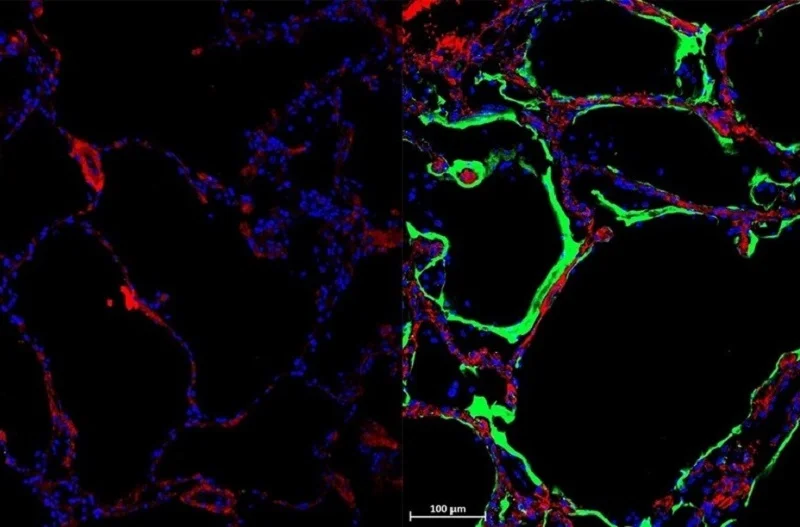University of Sydney discovers new protein that hinders Covid-19
10 Feb 2023
Clinical Study

Preview
Source: Pharmaceutical Technology
Left: Control Lung. Right: Immunofluorescent staining shows expression of new SARS-CoV-2 spike-receptor LRRC15 (green) in post-mortem lung tissue section from individual with Covid-19. Credit: Loo and Waller et al / The University of Sydney.
Researchers at the University of Sydney in Australia have announced the discovery of a new protein in the lung that can hinder Covid-19 infection.
The leucine-rich repeat-containing protein 15 (LRRC15) also forms a natural protective barrier in the body of human beings.
It is an inbuilt receptor that attaches to the SARS-CoV-2 virus and drags it away from the target cells.
This research from the University of Sydney is said to offer a pathway for developing new drugs for preventing infection from coronaviruses such as Covid-19 or dealing with lung fibrosis, where the tissue becomes thickened and scarred.
Published in the PLOS Biology journal, the study was led by Professor Greg Neely along with postdoctoral researcher Dr Lipin Loo and PhD student Matthew Waller at the Charles Perkins Centre and the School of Life and Environmental Sciences.
Neely said: “Alongside two other groups, one at Oxford, the other at Brown and Yale in the USA, we found a new receptor in the LRRC15 protein that can stop SARS-CoV-2. We found that this new receptor acts by binding to the virus and sequestering it, which reduces infection.
“We can now use this new receptor to design broad-acting drugs that can block viral infection or even suppress lung fibrosis.”
The researchers added that the presence or lack of the protein indicates the severity of Covid-19 infection.
As part of the study, the researchers screened human cell cultures for genes and investigated Covid-19 patients’ lungs.
For more details,please visit the original website
The content of the article does not represent any opinions of Synapse and its affiliated companies. If there is any copyright infringement or error, please contact us, and we will deal with it within 24 hours.
Organizations
Indications
Targets
Drugs
-Chat with Hiro
Hot reports
Get started for free today!
Accelerate Strategic R&D decision making with Synapse, PatSnap’s AI-powered Connected Innovation Intelligence Platform Built for Life Sciences Professionals.
Start your data trial now!
Synapse data is also accessible to external entities via APIs or data packages. Empower better decisions with the latest in pharmaceutical intelligence.




